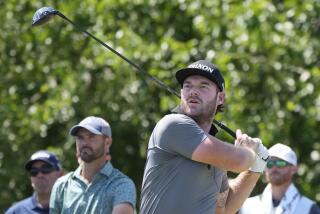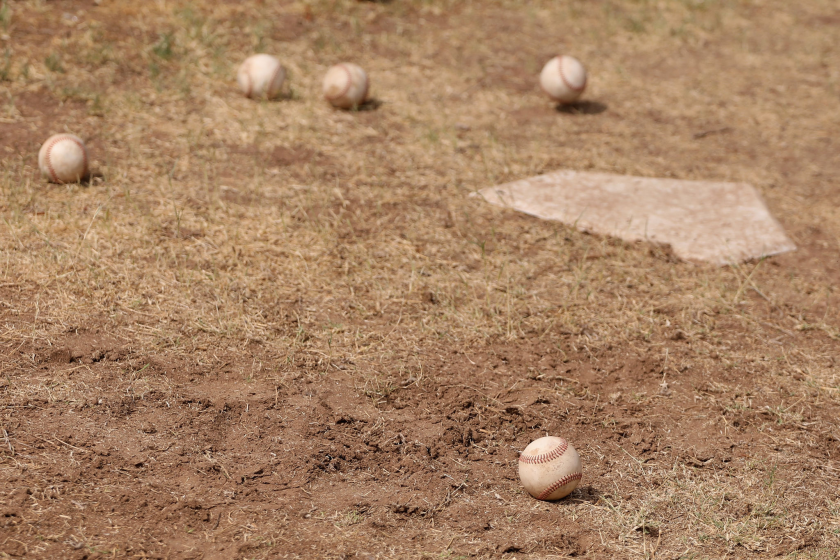Andy Murray’s edge: the mother of all tennis coaches
- Share via
LONDON — The tent in which she slept at a women’s tour stop in France once collapsed in a downpour. She couldn’t afford airline flights, so she reached tournaments by bus. Even as a pro tennis player in the late 1970s she’d go to the post office to retrieve money her middle-class parents had wired from Scotland.
Judy Erskine had no coach and no training facility near home. So earthy were her tour days that after one first-round loss, opponent Mariana Simionescu asked whether Erskine would join her in the locker room before they went to a bar, so Simionescu could have a smoke and hide it from her disapproving boyfriend, Bjorn Borg.
A larcenous hand plundered Erskine’s handbag one day in Barcelona and, homesick anyway, she returned to Scotland, where her father suggested she discontinue.
So the future mother and first architect of the game of one Andy Murray, who might just win the Wimbledon that begins today, took typing. She took shorthand. She worked as a secretary in a glass factory and an insurance office, a trainee manager at a department store, a saleswoman (with company car!) for a confectionary firm. She took French and German at Edinburgh University until she found the German dull and switched to business studies.
Then, when Judy Erskine became Judy Murray and had sons rapid-fire in February 1986 (Jamie) and May 1987 (Andy), she wound up imbuing their nascent tennis games with what she felt hers lacked, even long before she became a coach hired in 2007 by Britain’s Lawn Tennis Assn.
“I wouldn’t say I had any big shot, but I was very fast around the court,” Judy Murray said from Andy’s driveway outside London on the eve of Wimbledon. “I read the game well and I was very, very determined. I would run around the court and put balls back. I don’t know if I ever hit a winner in my life, but I would put balls back until the opponent would wear down.”
Once her sons began playing at the club 200 yards from home in the cathedral town of Dunblane, “I understood that if they were going to be any good, they had to have weapons. . . . I wasn’t a coach of biomechanics or anything like that. I understood how to play the game, and I probably taught them from a tactical basis.”
Then, long before Jamie Murray would win the family’s first Wimbledon title -- mixed doubles with Jelena Jankovic in 2007 -- Andy turned up at 11 at the Orange Bowl tournament in Miami with his mother and grandmother. Judy watched from off to the side because, even today, she sits in corners and disdains hearing people “chat inanely to me about what they think is going on.”
Her son won that tournament, and the scattered witnesses included Angela Buxton, the English 1956 Wimbledon singles finalist and doubles champion and present-day tennis consultant, who saw “beautiful, flowing shots” from “a boy who had a big, big, big future. He was toying with the boys. He was playing all these little drop shots and lobs. He understands the game, understands the court, understands the tactics.”
It foretold the trait that distinguishes Murray still, that has vaulted him to No. 3, enabled him to go 6-2 against Roger Federer, helped him become the first Briton in 71 years to win the Queen’s Club grass-court event in London: variety. A defensive aggressor, he can hit every shot in the book and some not in any book.
And his mother, Buxton said, well, “She’s one of the few people in this country who knows what she’s talking about,” a coach unafraid “to go out on a tangent and say something that’s new and arguable.”
As Britain has languished at a game it invented, as it has cohabited interminably with the words No British male has won Wimbledon since Fred Perry in 1936, as it has hoped through Englishman Tim Henman’s four gnashing semifinal appearances between 1998 and 2002, its ultimate answer might come from a family Judy says “never, ever” envisioned this.
As the daughter of a father who played professional soccer and parents who play tennis -- her father joshes he invented topspin -- Judy Murray lacks utterly the hey-let’s-play-for-fun gene, much like her son. (Just Sunday, Andy went go-karting, vowing to trim his lap time from 51.8 seconds to 51.3.) In Andy Murray’s entertaining book “Hitting Back,” written with the wit-rich London sportswriter Sue Mott, he recollects playing doubles at 8 with Judy and hearing her swear under her breath, a charge she deems plausible. He also scolds her for her ire at his racket-hurling default from a junior tournament because her own defaulting as a junior once irked his grandmother into driving home without her.
“I broke my racket,” the winner of 64 Scottish girls’ and women’s titles admits. “The head crumpled and I didn’t have another.”
Yet as she coached her sons until their early teens, she carefully avoided angst. She realized that her father’s chronic instructions as she’d leave home -- “See and win,” he would say -- might’ve muffled her own game into passivity for the fear of losing. So for long tennis trips, she’d purposely fill cars with four kids or minivans with 12 so the rides home didn’t groan with one child and one parent analyzing shortcomings. When the teenage Andy would quit the game for patches before he went to Spain at 15 to train in earnest, she’d consider it prudent.
Even now, the introverted Murray wrote, “I think Mum is the one person who gets me.” She nimbly could scout his opponents early in his career, including one report that frankly claimed the next opponent volleyed worse than Andy’s grandmother. When he texted her -- “I did it” -- from Bangkok in 2005 after he reached the top 100, she merely wept. Rather like Jimmy Connors’ mother-and-coach, Gloria, whom Judy admired, she still can hear his fretful voice on an international call and troubleshoot adroitly, partly because, he wrote, “She knows what I like to hear and what I don’t like to hear.”
All this, 22 years from her toughest 18 months, when she had two babies and felt “the frustration of an active person suddenly surrounded by mashed vegetable,” as she wrote in “Hitting Back.” She rates those 18 months harder than her tour days, harder than her divorce 12 years ago from a father still close to the sons, maybe even harder than that first childbirth, when the affable Jamie had been “a very big baby with a very big head,” she said. “It was horrendous and I thought, Oh, I’ll never do that again.”
Yet this July or another, all of Britain might just toast that she did.
--
--
Wimbledon
When: Today-July 5.
Where: All England Lawn Tennis and
Croquet Club.
TV: ESPN2, Channel 4.
More to Read
Go beyond the scoreboard
Get the latest on L.A.'s teams in the daily Sports Report newsletter.
You may occasionally receive promotional content from the Los Angeles Times.










